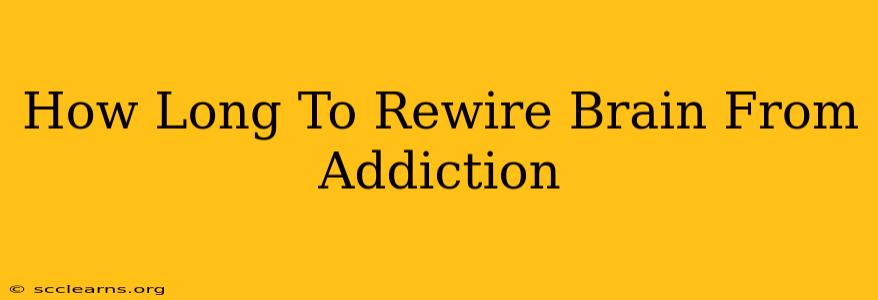Addiction is a complex brain disease, and the time it takes to rewire your brain from its grip varies significantly from person to person. There's no magic number, but understanding the process and factors involved offers a clearer picture. This article explores the timeframe, the factors influencing recovery, and what you can expect on your journey to a healthier, addiction-free life.
The Neuroplasticity of Recovery
The good news is that the brain is incredibly adaptable. Neuroplasticity, the brain's ability to reorganize itself by forming new neural connections throughout life, is central to recovery. With sustained effort and the right support, the pathways associated with addiction can be weakened, and healthier ones can be strengthened.
Understanding the Rewiring Process
Addiction hijacks the brain's reward system, creating powerful cravings and compulsive behaviors. Rewiring involves:
- Breaking the Habit Loop: This requires consciously interrupting the cycle of craving, seeking, and using. Therapy and support groups play a crucial role in this phase.
- Strengthening New Pathways: Building new, healthier habits and coping mechanisms strengthens alternative neural pathways, providing a counterbalance to addictive urges. This often involves developing new interests, hobbies, and healthy relationships.
- Healing the Underlying Issues: Addiction often stems from underlying trauma, mental health conditions, or other challenges. Addressing these root causes is crucial for long-term recovery.
Factors Influencing Recovery Time
The timeframe for rewiring your brain from addiction depends on several key factors:
- Type and Severity of Addiction: The specific substance or behavior involved, as well as the severity and duration of the addiction, will affect the recovery timeline. Some addictions may require a longer period of rewiring than others.
- Individual Characteristics: Personal resilience, coping mechanisms, and pre-existing mental health conditions all influence how quickly the brain adapts to change.
- Treatment Approach: The type of treatment chosen significantly impacts recovery. Evidence-based therapies such as cognitive behavioral therapy (CBT), dialectical behavior therapy (DBT), and motivational interviewing (MI) have been shown to be effective. The level of engagement in treatment also greatly influences outcomes.
- Support System: A strong support network consisting of family, friends, support groups (like Alcoholics Anonymous or Narcotics Anonymous), and therapists significantly increases the chances of successful and quicker recovery.
- Commitment to Recovery: Consistent effort, dedication to therapy, and willingness to adopt new healthy behaviors directly correlate with a faster and more sustainable recovery. Relapses are a part of the process for many, and a commitment to learn from setbacks is crucial.
What to Expect During Recovery
Rewiring your brain from addiction is a journey, not a destination. Expect:
- Intense Cravings: Cravings can be intense, especially in the early stages. Learning to manage these cravings through coping mechanisms is a key skill to develop.
- Emotional Ups and Downs: Recovery is an emotional rollercoaster. Periods of progress will be interspersed with setbacks and emotional challenges.
- Setbacks and Relapses: Relapse is not failure. It's an opportunity to learn and adjust the recovery plan.
- Gradual Progress: Recovery is a process of gradual, incremental improvements. Don't expect overnight changes. Celebrate small victories along the way.
Seeking Professional Help
The process of rewiring your brain from addiction is best navigated with professional guidance. Therapists, counselors, and addiction specialists can provide individualized treatment plans, support, and coping strategies. Don't hesitate to reach out for help – it's a sign of strength, not weakness. Recovery is possible, and with the right support, you can build a healthier, happier life free from addiction's grip. Remember to be patient with yourself, and celebrate every step forward you make.

